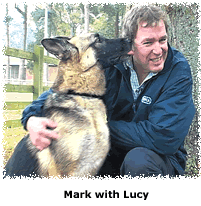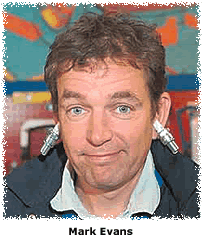In the spotlight - Mark Evans

Mark Evans, Veterinary Adviser to the RSPCA
MARK EVANS is a name which will undoubtedly mean different things to different people in
the world of dogs. His controversial interview on the BBC’s Pedigree Dogs Exposed, as the RSPCA’s chief veterinary advisor, caused uproar within the canine world, with his statement concerning welfare and quality of life of many pedigree dogs being seriously compromised by established breeding practices for appearance, driven primarily by the rules and requirements of
competitive dog showing and pedigree dog registration.
The fallout following the programme was unprecedented and was quickly followed by the news that both the RSPCA and Dogs trust were withdrawing their stand presence at Crufts.
As the dusts settles, we invited a selection of breeders, exhibitors
and dog owners to ask Mark their own questions.
Q: In the programme, a Rhodesian Ridgeback breeder explained in detail how she arranged for the euthanasia of some puppies that, in her opinion, carried congenital defects. During this time, she openly said that her local vet refused to do it but she found another vet that did. My question is not specifically directed at the RSPCA but to the veterinary profession in general... What does a member of the RCVS think about the fact that some vets will destroy dogs (puppies) apparently on the whim of a 'so-called' expert?
John Beacock, Keeshond owner
A: I think it is indefensible for someone to breed a litter with the pre-meditated intention of destroying any perfectly healthy puppies that do not look the way that person wants them to. Vets should not be put in the position of having to grapple with such avoidable ethical dilemmas.
Q: Mark, can you defend the remark you made on the programme that pedigree dogs were 'mutants'? If you feel you must withdraw it, as I believe you must for it is scientifically inaccurate, would you now be prepared to accept that many pedigree dogs are as sound and healthy as many mongrels?
David Cavill, Finnish Spitz breeder and championship show judge
A: I was asked a very direct question: “What do you see, Mark, when you watch Crufts?” I gave an honest answer and shared a long held opinion that I have articulated publicly for the last 20 years. From the response that my comments and the BBC programme have generated, it would seem that huge numbers of ordinary people share my views. But of course not everyone agrees – I didn’t expect them to.
The bottom line is that there is no right or wrong answer to such a question. It is up to each and every one of us, as individuals, to decide. But, I believe that my answer was factually accurate. The Kennel Club itself refers to Crufts as “a formal beauty contest for Kennel Club registered pure-bred dogs”. And, as for the word mutant, it has many meanings, including “any organism differing from the wild type”. That definition clearly applies to a greater or lesser degree to every dog shown at Crufts.
The RSPCA believes that the extent to which some breeds of dog differ anatomically from the wild type is a major cause for concern and welcomes the Kennel Club’s recent announcement that it will be reviewing all 209 breed standards as a matter of urgency. We have requested detailed information from the Kennel Club as to how the review will be conducted as we believe it is of paramount importance that health and welfare are prioritised over arbitrary appearance. Previous attempts at reviewing some breed standards have done little more than tinker around the edges. We trust that this review will be rational, relevant, radical where necessary and, most importantly, scientifically rigorous.
I am sorry if some people misinterpreted my answer, but I am very pleased that it has helped fuel the current debate. At long last, the world has woken up to the fact that the welfare of many pedigree dogs is seriously compromised as a result of the way they are bred. How can any dog lover believe it is right to intentionally breed dogs that are clearly deformed and disabled?
I am very concerned that some people seem to think that the RSPCA believes that all pedigree dogs are riddled with disease and all crossbreeds are healthy. This is a ridiculous notion. We have never said or inferred that. What we have said is that there is compelling scientific and other evidence that the welfare of hundreds of thousands of dogs is compromised as a result of their breeding. Of that, there is no doubt.
The RSPCA has also been accused of condemning all pedigree dog breeders. Again, this is absolutely ridiculous and totally untrue. Our position has always been crystal clear. The RSPCA applauds those dog breeders, clubs and societies that recognise welfare problems faced by their breeds - and that implement sound proactive strategies based on good science, as well as experience and common sense - to address them.
 Q: It is very rare for any concerns or observations to be raised regarding the temperament of dogs. What would Mark (RSPCA) regard as acceptable temperament for any dog whether for show or not?
Q: It is very rare for any concerns or observations to be raised regarding the temperament of dogs. What would Mark (RSPCA) regard as acceptable temperament for any dog whether for show or not?
Neil Ewart
A: The RSPCA believes that every dog should be born with the best possible chance of living a healthy and happy life, well-suited to the lifestyle it is likely to lead.
Every dog owning situation is different, but in general, dogs with the following kind of temperament are likely to be better-suited to family life: confident but not too cocky, friendly to all kinds of people and other animals, easily trainable, sensibly cautious but not phased by new experiences, happy to be handled and groomed and to share their resources and territories. Not an exhaustive list, but you get the idea.
An individual dog’s temperament will depend on its genetic make-up and life experience. There are well known and well documented breed differences and the way a puppy is brought up and socialised can have a significant impact on how they respond to situations and behave throughout their lives. That’s why the RSPCA encourages all potential dog owners to do their research thoroughly and to think carefully before taking on any dog. All too often neither dogs nor their owners get as much out of their lives together as they could or should, simply because they are not well-suited.
Q: How much cash from the millions donated to the RSPCA, has been spent on research into hereditary diseases in dogs over the past five years?
Bill Bunce
American Cocker Spaniel breeder and owner
A: Several months ago we commissioned an independent review of the science in relation to this issue. As I write these answers for you, the animal welfare scientists and veterinary specialists involved are considering a raft of recommendations for possible ways forward and, as promised back in August, we will be publishing a full report of their findings and conclusions early next year. We hope the report will help focus everyone’s thoughts and will be a constructive contribution to the ongoing debate - money well spent.
Q: A big concern following all the furore is the potential market for designer crossbreeds and unregistered (untested) pedigree dogs. Many people think that the programme has done a vast disservice to DOGS in general – puppy buyers now think that a crossbred or unregistered dog will automatically be healthier than a KC registered dog or dog from a breeder! That's the message the programme and Mark Evans put out very powerfully...hundreds of thousands of diseased pedigree dogs, mutants or whatever; it’s turned everything on its head. How do you feel about that?
Vince Hogan, OUR DOGS
A: The RSPCA loves dogs and fully appreciates and recognises the important role that pedigree dogs play in the lives of millions of people worldwide. As an organisation, we are committed to protecting and improving their welfare.
Not once in this debate has the RSPCA said “crossbreeds and unregistered pedigree dogs are automatically healthier than registered pedigree dogs” – that is a crazy idea. The RSPCA’s aim is to help empower people to make well informed decisions about the dogs they choose and the way they care for them. We believe that good dog breeders, those who genuinely prioritise above all else the health, welfare and temperament of the dogs they breed should be celebrated.
The difficulty for all would-be owners is identifying who these people are. Even the Kennel Club admits there are problems with its Accredited Breeder Scheme, which does not guarantee the health and welfare of the individual it refers to.
No matter what kind of dog they are after, would-be dog owners should be extremely cautious about who they buy from. Just as crossbreed and unregistered pedigree dogs are not automatically healthier than registered pedigree dogs, the converse is also true. Pedigree certificates are not the “badge of quality” in terms of health and welfare that most people either think they are or expect them to be.
The RSPCA believes that there is compelling scientific and other evidence that very significant numbers of pedigree dogs are vulnerable to predictable disease and disability because of they way they are bred. In terms of inherited diseases alone, more than 450 genetic defects are recognised in pedigree dogs.
The associated welfare problems affect very large numbers of animals, generation after generation. Some disorders can cause severe pain, discomfort, anxiety and other unpleasant feelings. And, animals can be affected for prolonged periods and for a significant proportion of their lives.
No one knows precisely how many dogs are affected by each and every condition to which pedigree dogs are predisposed, but from the evidence that is available it is clear that “hundreds of thousands” is a valid and reasonable estimate.
The results of the Kennel Club’s own 2004 Purebred Dog Health Survey showed that 37.4 per cent of the dogs surveyed had at least one reported health problem. That equates to almost 2 million dogs. And, given the survey’s disappointingly low response rates, it is extremely likely that health problems were under reported.
Q: Will the RSPCA Veterinary Adviser be prepared to meet with PROGRESS and their own veterinary advisers in private to discuss their concerns about the Pekingese breed?"
Geoffrey Davies, Pekes PROGRESS
Answer: Geoffrey, please get in touch with me by writing to: Companion Animals Department, RSPCA, Wilberforce Way, Southwater, Horsham, West Sussex, RH13 9RS.
 Q: How many healthy dogs has the RSPCA put down in the last twelve months?
Q: How many healthy dogs has the RSPCA put down in the last twelve months?
Les Siddall, Basenji owner
A: Every year the RSPCA, vets, local authorities and other animal welfare organisations reluctantly put down unwanted dogs that cannot be rehomed. This is horrendous and frustrating for all concerned.
In the vast majority of cases, the underlying reason is irresponsible dog ownership. Every year, RSPCA animal centre staff dedicate themselves to picking up the pieces when human-dog relationships fail.
In 2007, we had gave 15,787 unwanted dogs a second chance in life through finding them suitable long term homes in England and Wales. Sadly, there are never enough people willing to adopt all the dogs waiting for new owners and some dogs cannot be rehomed as a result of illness, injury or as a result of behaviour problems.
Our aim is not to euthanase any dogs that are physically and mentally healthy. But sadly, last year, the RSPCA had no choice but to euthanase 1,230 individuals because we could not rehome them. As dog lovers, just imagine how angry that makes us feel. Who should take the blame? Us, or the people who irresponsibly bred them, owned them or abandoned them?
The solution is not to build ever bigger dog rescue and rehoming centres but to reduce demand on the centres that already exist. And that means, collectively, all those who supply dogs and all those who own them behaving more responsibly.
We take this issue very seriously and monitor how many dogs are put to sleep by local authorities and animal welfare organisations in our report The Welfare State: Measuring Animal Welfare in the UK 2007, due to be published early November.
Q: Do you think that transmitting of information in this manner to the general public via this programme was the correct way to go about highlighting these issues?
Lorna Hastings, Lorianna Canaan Dogs & Border Collies
A: The RSPCA has publicly voiced its concerns about the welfare of pedigree dogs for many years and sees the programme as a much-needed catalyst for change.
I, for one, believe it was shocking, not because it was a gratuitously sensational documentary, but because it simply brought home the very painful truth that many of our most loved dog breeds are in real trouble. Not the fault of the poor dogs themselves, of course, but the fault of those of us who, over many generations, claim to have cared about them the most.
From the huge public response that we and others have received, it is clear that the programme simply illustrated the long held concerns of some dog lovers and confirmed the worst fears of many more.
But, most importantly, it opened the eyes of the vast majority of ordinary folk who had never really thought about it before. Over just 60 minutes, it suddenly dawned on them, for the first time, that breeding dogs with flat faces that can’t breathe properly or with deformed skeletons, or with excessively wrinkled skin, or with virtually no fur or so biomechanically compromised that they can’t even walk properly, is simply wrong.
The programme also revealed to the blissfully unaware that rules and regulations that could reasonably be assumed to be in place to protect the welfare of pedigree dogs are in fact promoting and legitimising breeding strategies that would be considered totally unacceptable if indulged in by humans and certainly not in the best interest of dogs at all.
The welfare problems faced by pedigree dogs have been well known for decades. But considering how serious, how predictable and how unnecessary the suffering is, initiatives to resolve the known problems have been rather thin on the ground. Even some of the best known ones have been disappointing to say the least in terms of their effectiveness.
Of course, I completely understand that some breeders found the documentary extremely unpalatable. But it did what it said it would do. It exposed some really dubious practices and some seriously rotten apples. But it didn’t say that the whole barrel should be condemned, and neither has the RSPCA.
I think it is perfectly reasonable for the public and for the RSPCA to assume that genuinely good breeders who feel they’ve been misrepresented will now focus their passion, energy and enthusiasm on clearing the remaining rotten apples from the barrel rather than having a go at those who have simply lifted the lid and had a look inside.
As well as the identification and implementation of workable, effective ways to solve specific welfare problems faced by pedigree dogs - and the prevention of new ones - there also needs to be a sea change in public attitude so that the most desirable dogs are those which are fit, healthy and able to enjoy a good quality of life.
If the recent BBC documentary spurs everyone on - and that includes the RSPCA - to work tirelessly to attain those goals, then it will have done more in 60 minutes than I or anyone else could achieve, alone, in 60 years.
Q: Does he really believe that all dogs should be crossbreeds and not designed to fit a purpose or have a task?
John Ford, pet owner
A: Of course not. But let’s not forget that the vast majority of pedigree dogs do have a very important purpose. To share our lives. To be our companions. To be our pets.
It is curious that, with the possible exception of puppy trafficking, the supply chain for pet dogs is driven, not by the “consumers” as it were, but by the producers. That’s not only contrary to normal market forces but, as far as the RSPCA is concerned, it simply doesn’t make sense. In general, would-be dog owners buy what is made available to them rather than demand what they really want. Is that a good thing for dog welfare?
Think about it. No matter how cute, doughy-eyed, glamorous, tough or hirsute a particular dog may look, is that really what is? Should appearance be the most important thing for a would-be pet dog owner, even if they find a particular physical trait rather appealing? I think not.
I think the vast majority of people who want to take on a pet dog would first shortlist types of dog that have the best possible chance of a happy, healthy life if they are properly informed. Dogs that are well suited to their lifestyle, have a friendly, amenable temperament and that are unlikely to run up huge vet bills, be subject to massive health insurance premiums or need long term nursing to help them cope with chronic disability and disease. Of course, appearance will always be a consideration, but not the main one if all the facts are known in advance.
If that is what people want, then that is what they should demand. The supply chain will respond. After all it does in every other walk of life. The trick then, of course, is to make absolutely sure that buyers can tell the difference between quality and counterfeit, the really good breeders from the rogues. Again, education is the key. The best will shine. The rest will be left in the dark.
So what’s the RSPCA’s role in all this? Not to regulate pedigree dog breeding; hopefully, that will never be necessary.
Our aim is this: to ensure that, throughout the course of a lifelong relationship with a pet dog, every owner has access to the information, resources and help they need to make properly informed decisions. And that includes what kind of dog to get in the first place.
Q: In some instances, breed exaggerations and deformities have existed for almost half a century, what have the RSPCA done resolve the issue? Why only now?
Mike Homan, Staffordshire Bull Terrier owner and judge
A: As I said before, the RSPCA has voiced its concerns about pedigree dogs for many years and we feel it is extremely important to understand in detail how the problems facing pedigree dogs have arisen so that we can identify possible solutions and learn from successes and mistakes. But what’s the point in a witch-hunt? Surely, we have to be pragmatic, accept that we are where we are and, together, move forward towards a better future for pedigree dogs.
This is a very complex issue and all of us involved in dog welfare have a mountain to climb to solve it. Unfortunately, most of the mountain is still covered in mist, but over the next few months, as knowledgeable, committed, determined souls consider the options and find ways to work together constructively, the mist will begin to clear and the ascent can begin.
The RSPCA believes that all those who benefit from pedigree dogs have a collective responsibility to contribute to the climb. That includes not just breeders, but also the veterinary profession, pet food manufacturers, the pet pharmaceutical industry, pet insurers and of course pet owners. The RSPCA will do everything it can to help.
Q: If the RSPCA and other dog welfare organisations believe that Crufts is all about cruelty etc; Why have they decided to boycott the show? Should they not be present to witness the alleged cruelty and take action?
Andrew Graham
A: Purebred dog ‘beauty pageants’, such as Crufts (KC description), that use current Kennel Club breed standards as the main judging criteria actively encourage both the breeding of deformed and disabled dogs and the inbreeding of closely related animals. The health and welfare of many pedigree dogs is compromised as a result.
The RSPCA believes that from a dog health and welfare perspective, such beauty pageants are fundamentally flawed and do our much loved pedigree dogs no favours. That is why we pulled out of Crufts 2009.
We would like to see the emphasis at shows shifted away from appearance, so that health, welfare and temperament are considered first and foremost. We know responsible breeders will agree, but the problems needed first to be highlighted before change can occur.
The RSPCA is committed to preventing animal welfare problems as our primary purpose – that is what the P stands for. We would much rather educate rather than prosecute.
Q: Does the RSPCA really believe that a rescue dog is a healthy, well balanced alternative to a lovingly reared pedigree puppy by a responsible breeder?
Marcelle King, Belgian Shepherd Dog owner and judge
A: I have already answered a very similar question above.
But just to confirm, it is not for the RSPCA to tell people what kind of dog they should buy or avoid. Would-be dog owners must make up their own minds. After all, once they obtain a dog, it is their legal responsibility to provide for its needs, through thick and thin. Our aim is to make sure that people have the knowledge and resources necessary to make properly informed decisions about dog ownership and care.
However, given the huge number of unwanted dogs being looked after by animal shelters at any given time, we will always encourage would-be owners to consider adopting a dog from a rehoming centre. Giving an unwanted dog a second chance in life can be an incredibly rewarding and wonderful experience, but it is not for everyone. Matching the right new owners with the right dogs is always our primary concern.
We always have hundreds of dogs that desperately need new loving homes. It doesn’t matter to us what they look like, or whether they are pedigree dogs or crossbreeds, each dog is treated as an individual and we will do everything we can to make sure they find caring new owners. We just want them to be happy and healthy.
Q: Mark, what are your views on people who keep alive sick dogs who are never going to get any better, beyond help, as exampled on the programme?
Ali Smith, Editor, OUR DOGS
A: Under the Animal Welfare Act 2006, dog owners have a legal responsibility to care for their pets properly. This includes an obligation to provide protection from and the treatment of illness and injury.
As far as I am aware, all the dogs featured in the BBC programme were under veterinary supervision and it is not appropriate for me to comment on specific cases.
But, I am happy to make a few general comments. Like everyone else who watched Pedigree Dogs Exposed, I found some of the footage extremely distressing. Sadly, though, I was not shocked. During the years I spent as a practising vet, I think more than half my time was spent attending to the needs of pedigree dogs with predictable welfare issues as a result of physical deformity and inherited disease.
I feel desperately sorry for owners who end up emotionally and financially drained trying to do the very best they can for their poor dogs when they are ill. Deciding when to draw the line and euthanase a much loved family friend is every dog lover’s worst nightmare. I have helped countless people through it, and very recently, I had to make the decision myself when the time came to say goodbye to my own dog Jessie.
What makes me really, really angry are those irresponsible people who breed dogs knowing that the puppies they produce are likely to end up with predictable health problems. It’s bad enough for the poor dogs concerned but what makes it even worse is the fact that all too often it is ordinary pet owners, not those who bred the dogs, who end up having to pick up the pieces. It is disgraceful, nethical and immoral.
Q: and on a similar theme: If the RSPCA is so concerned about cruelty, why isn’t the RSPCA taking action against the owners in the programme who were happy to video their dogs suffering and not have them put down?
A: Please see my answer to the previous question.
Q: How does Mark Evans feel about the mass sale of many different breeds of puppies from outlets such as pet superstores who do not register with the Kennel Club? What are his views on the impulse purchase of puppies from such outlets instead of buying from a caring breeder who is there to provide back up and advice?
Kerry Rushby, Leosrus Leonbergers & Tibetan Terriers and judge
A: The RSPCA would like to see a change in the law regarding the way that puppies are sold through the pet trade and we are actively pursuing an opportunity to achieve this as part of Animal Welfare Act 2006 secondary legislation.
We have submitted proposals to Defra highlighting the importance of a robust, enforceable traceability scheme for puppies. In Scotland there are proposals to set up a licensing scheme for people who deal in young dogs and cats. As England is experiencing the same problems as Scotland we have urged Defra to look at this as a potential model for the future.
If there was a system of traceability introduced which enabled people to discover exactly where their puppy has come from, the environment in which it was bred and so forth – including those bought in et shops – then this would help stamp out unscrupulous sellers.
Unfortunately at the moment, this is not possible and that’s one of the reasons why buying the perfect puppy is such an incredibly difficult process, especially for inexperienced first time dog owners.
No matter who you buy from, there are clearly a few golden rules. They include making absolutely sure that you see the puppy with its mother in the home where it was born or, if that is not possible, you have compelling evidence that the puppy has been bred well and been brought up in an appropriate environment.
But here’s the rub. Just because someone says they are a responsible pet shop owner, or a Kennel Club Accredited Breeder, or they have been breeding puppies for 40 years, or that they have bred a Crufts champion, or that the puppy comes with a Kennel Club pedigree certificate, doesn’t mean nything in itself in terms of the health and welfare of the puppy they are offering for sale.
We advise buyers to be ultra cautious and to trust no-one until they are proven trustworthy. The approach should include posing lots of probing questions about the puppy’s geneology, management since birth and socialisation, checking out the health records of the puppy’s parents – including the results of all the appropriate disease screening tests, tracking down puppies from previous matings of the same parents, and seeking professional advice if required from both vets and appropriately qualified animal behaviour experts. All responsible breeders will, I’m sure, agree with such an approach.
Q: What can you tell Our Dogs about the A348,000 donated to the RSPCA by the Kennel Club?
Vince Hogan, Our DogsA: We think the Kennel Club was referring to A348,000 which was raised by the ‘Pedigree Adoption Drive’ and allocated to 16 RSPCA branches by the Kennel Club’s Charitable Trust, which administered the fund.
And finally Mark, do you feel your comments on the programme have actually helped pedigree dogs and their owners or do you not feel you have created an atmosphere of fear and uncertainty where none existed before?
The RSPCA has been extremely concerned about the unacceptably high levels of deformity, disability and disease affecting pedigree dogs for some time. We, like many others who appeared in the programme, had to seize the opportunity to voice these concerns and we’re very glad the BBC documentary has brought this issue to the fore.
We believe we have taken a rational, sensible, scientific approach to all our communications on this subject. For example, in relation to inherited diseases, we have very deliberately avoided making references to particular breeds, as we believe that doing so could inadvertently victimise those breeds about which most is currently known. Our position statement is available to view at www.rspca.org.uk.
Over the last two months, the personal messages of support that I and the RSPCA have received from the public, vets, animal behaviour experts, animal welfare scientists, breeders, trainers, nurses, ordinary dog lovers and other like-minded people has been overwhelming. And they’ve been pouring in from all over the world. In all the years I have worked in animal welfare, I have never known anything like it.
We believe that this is an extremely serious dog welfare issue and it is very, very clear that millions of people share our views. Just a few days ago, I found myself sitting next to a professor of animal welfare. During the meeting – about a completely different subject – he leant over and whispered in my ear: “You have done the right thing”. I am sure I have too.
Of course, there are also some people who now see me as public enemy number one. Some of their comments and emails have been extremely personal, nasty, abusive and vindictive. But I expected nothing less. There will always be those who choose to ignore reality and bury their heads in the sand, but before doing so, try to shoot the messenger. I think everyone should feel free to express their opinions. This is, after all, a debate.
At the end of the day it is for society, and every individual within it, to decide what is acceptable inpedigree dog breeding and what is not. Our aim is to advise and inform and to encourage people to focus on the facts not fantasy.
I didn’t have to take part in the BBC programme, but I am very glad I did. But actions speak louder than words and I am much more proud of the pro-active efforts that the RSPCA is taking to move this debate forward towards achieving real welfare outcomes for pedigree dogs.
A major step forward has been the Kennel Club’s new approach, and we have requested detailed information concerning the initiatives it has announced as part of its new and extraordinarily ambitious six-month action plan. We will consider that information very carefully before making a formal response.
I fully understand why some breeders and pedigree dog owners are upset and concerned about thefuture – change is never easy. But change is what must happen. This is an entirely man-made problem that needs an urgent man-made solution. We must all put our differences aside and work together.
If we don’t, pedigree dogs will continue to suffer unnecessarily and their welfare will continue to decline. Doing nothing or tinkering around the edges are simply not options.
So Mark, what’s next?
The independent review of the science in this area, commissioned by the RSPCA several months ago has come up with an initial list of recommendations for the future that are now being discussed and debated by relevant experts. A complete report of their findings and conclusions is due to be published soon. The initial recommendations fit into four main themes:
1. A complete review and overhaul of the current rules and regulations relating to pedigree dog registration and formal competitive dog showing (including breed standards and their use) with health, welfare and temperament as key priorities.
2. The development and effective implementation of breed specific health strategies that take health and welfare into account and that include pro-active steps to increase genetic diversity.
3. Improved long term data collection, analysis and reporting, particularly in relation to causes of disease and death in dogs.
4. Education is essential. Public attitude needs to change so that the most desirable dogs are those which are fit, healthy and have a high quality of life. Would-be owners need to be much better informed and much more demanding.












